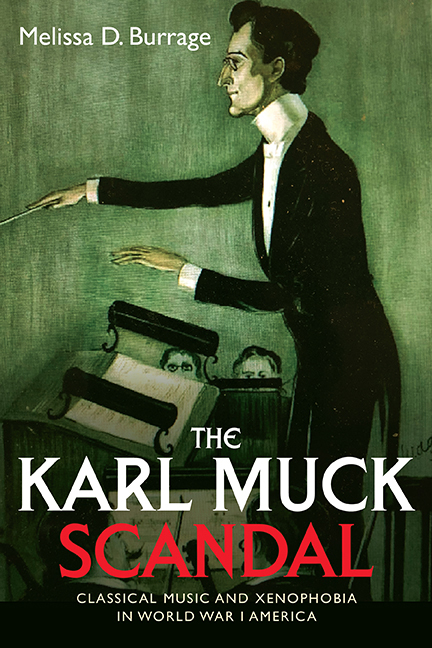Book contents
- Frontmatter
- Dedication
- Contents
- Introduction
- 1 Here on Foreign Shores: Dr. Karl Muck's Acclaim in Boston (1906–1918)
- 2 Mobilization: A Changing Environment for Boston (1917)
- 3 Selling the War: Demonizing the Enemy (1918)
- 4 “Looking for the Trump Card”: Mrs. William Jay's Attacks on Karl Muck in Wartime America (1915–1918)
- 5 “A Leaf in the Storm”: Muck, Higginson, and the Boston Symphony Orchestra (1918–1919)
- 6 Muck's Arrest: “Finding ‘One Weak Spot’” (1918–1919)
- 7 “Only Too Proud to Shoulder It All”: The Sexual Climate of Wartime Boston and Muck's Fall from Grace (1918–1919)
- 8 Muck's Final Years: His Association with the Wagners and Adolf Hitler (1920–1940)
- Coda (1919 to Present)
- Acknowledgments
- Notes
- Bibliography
- Index
- Eastman Studies in Music
5 - “A Leaf in the Storm”: Muck, Higginson, and the Boston Symphony Orchestra (1918–1919)
Published online by Cambridge University Press: 06 September 2019
- Frontmatter
- Dedication
- Contents
- Introduction
- 1 Here on Foreign Shores: Dr. Karl Muck's Acclaim in Boston (1906–1918)
- 2 Mobilization: A Changing Environment for Boston (1917)
- 3 Selling the War: Demonizing the Enemy (1918)
- 4 “Looking for the Trump Card”: Mrs. William Jay's Attacks on Karl Muck in Wartime America (1915–1918)
- 5 “A Leaf in the Storm”: Muck, Higginson, and the Boston Symphony Orchestra (1918–1919)
- 6 Muck's Arrest: “Finding ‘One Weak Spot’” (1918–1919)
- 7 “Only Too Proud to Shoulder It All”: The Sexual Climate of Wartime Boston and Muck's Fall from Grace (1918–1919)
- 8 Muck's Final Years: His Association with the Wagners and Adolf Hitler (1920–1940)
- Coda (1919 to Present)
- Acknowledgments
- Notes
- Bibliography
- Index
- Eastman Studies in Music
Summary
Oh, German melody, stand forth and sing
Thy meaning to these dull, unwilling ears
That listen now with me! So let it ring.
A Teuton truth, through mists of blood and tears.
To ignorance and prejudice, to hate.
To fear, to faltering hope and fecund lie,
Speak now thy classic word, and vindicate
A people's honor with serene reply.
They sit before thee, silent, unentranced,
And I among them silent—but my heart
Is thine with understanding, and each note
Blesses, my German heritage, enchanced
And glorified with pain that seems a part
Of this great song the German master wrote.
—Lady Speyer's Poem to Muck, 1919Henry Lee Higginson, financier and founding director of the Boston Symphony Orchestra, who single-handedly established one of the most successful musical institutions in the United States, faced enormous social and economic pressure to maintain his orchestra during World War I. As mentioned in chapter 1, Higginson had established the BSO by adopting German traditions—building a German-style concert hall, gilding Beethoven's name above the stage, and hiring many German musicians to perform European compositions for his audiences. In the prewar years, Boston defined American cultural identity. German influence was inseparably intertwined with every facet of music making in the city. By 1918, however, the nation's attitude toward Germany was changing. America was rejecting German cosmopolitan culture and a space was opening up for something new.
Muck, too, was caught in these changing times. He was Higginson's most visible “company man.” Actions taken against him occurred when America was at a crossroads, when workers pressed for greater justice in the workplace, when large-scale businesses came to dominate the market, when capitalists gained power using unscrupulous methods to defeat their competitors, and when the federal government became more bureaucratic and powerful. Higginson and Muck felt all of these pressures.
Higginson, the classic paternalist, attempted to meet the needs of his musicians and protect them in a fatherly way from outside forces. He viewed music in universal terms and assumed that political conflict would never penetrate Symphony Hall. During the war, however, his way of thinking was naïve, and he was unable to shield Muck and his German musicians from state pressures. Targeted by Mrs. Jay of the New York Philharmonic, who viewed music politically, Muck became fuel for a frightening nationalistic cultural battle exploding in Boston and New York.
- Type
- Chapter
- Information
- The Karl Muck ScandalClassical Music and Xenophobia in World War I America, pp. 173 - 217Publisher: Boydell & BrewerPrint publication year: 2019



